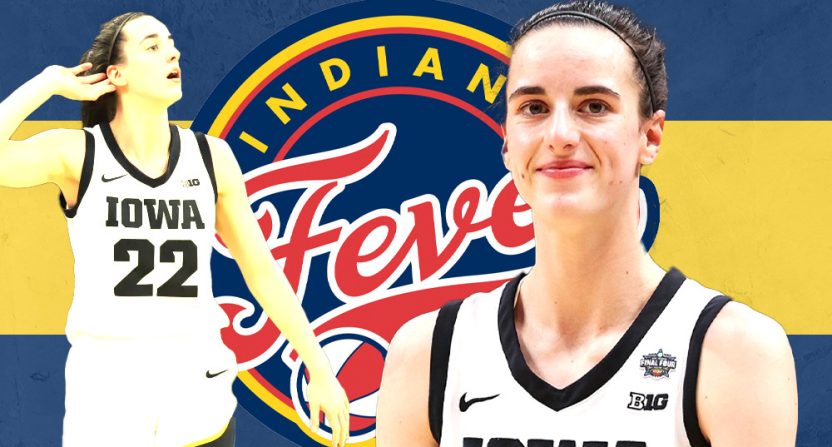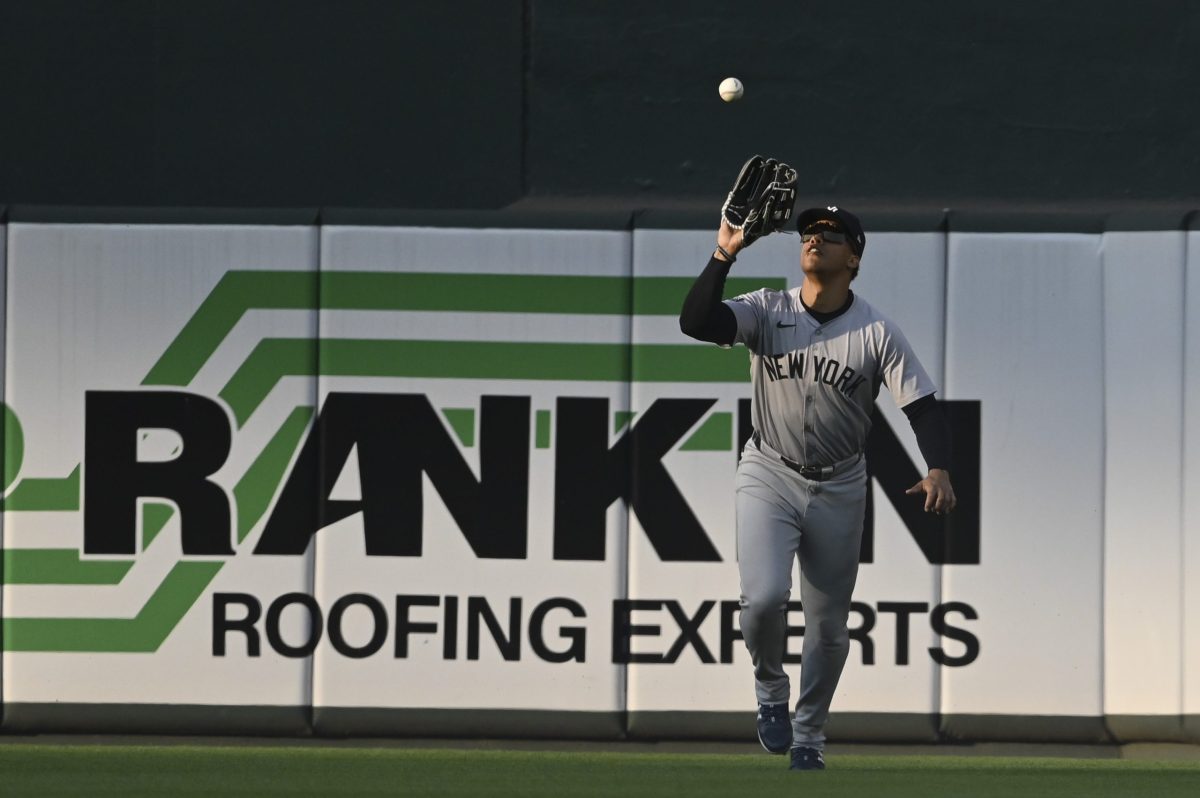Greatest of all time. It’s a label that stirs up controversy no matter which athlete it is ascribed to and Caitlin Clark, the latest recipient of “GOAT” status by many new fans of women’s basketball is no exception. However, one thing is clear: she is certainly the GOAT in terms of media coverage in women’s hoops. The “Caitlin Clark effect” is real–as the projected first-overall 2024 WNBA Draft pick, she’s already brought in hordes of attention for her would-be future team, the Indiana Fever. So much so that it’s estimated that 26,000 additional fans will attend Fever games this season, which is why WNBA teams like the Las Vegas Aces have moved venues for Fever games to accommodate an additional 8,000 fans and 36 of the Fever’s 40 regular season games will be nationally televised this year.
Most recently, Clark appeared on SNL’s Weekend Update alongside hosts Michael Che and Colin Jost to roast Che, who, just a few weeks ago, made a joke about sports bars like the Sports Bra, a Bar of Their Own, and other similar hot spots, that exclusively play women’s sports.
“A number of sports bars around the country are promising to only show women’s basketball games during March Madness. The bars are known, collectively, as the empty ones,” he “joked” in early April.
The jab is not only painfully overdone and unfunny–it’s also inaccurate. Contrary to Che’s commentary, these bars have made great business amid the recent explosive growth of women’s sports. And unlike Che, Clark’s SNL jokes about women’s sports were actually funny and her performance was memorable in a good way. Aside from reading back Che’s litany of past segments dunking on women’s sports–after Che insisted that he didn’t joke about women’s sports “on the regular”–Clark also used her platform to pay homage to legendary women’s basketball players who, despite their lasting impact on the game, have been largely shut out of sports media coverage for decades.
“I’m sure [my rookie season in the WNBA will] be a big first step for me,” Clark said on the SNL set. “But it’s just one step for the WNBA, thanks to all the great players like Sheryl Swoopes, Lisa Leslie, Cynthia Cooper, the great Dawn Staley, and my basketball hero, Maya Moore. These are the women that kicked down the door, so I could walk inside.”
Media coverage surrounding women’s hoops is almost always a good thing for fans of the game and Clark’s latest appearance is no exception. Women’s sports overall are underrepresented and under-resourced in traditional sports media so this past season’s record-breaking women’s March Madness tournament was a breath of fresh air for longtime fans… for the most part. Although it’s a relief to see women’s basketball finally receive the attention it’s deserved for years, so much of the conversation has revolved around Caitlin Clark that other deserving players have been snubbed out of the spotlight. It’s not that Clark doesn’t deserve praise–she certainly has earned every accolade she’s received–but the proclivity of sports media to hyper-revolve around trendy talent is a dynamic that not only Clark herself has taken note of. Take it from UCon’s Page Bueckers, someone who was once the poster child of women’s college hoops not too long ago and who also called out this dynamic earlier this year.
“Media coverage is important for the game. I think it grows the game,” Bueckers said in an interview during the tournament. “I know freshman year I was like the media darling. Everybody was focused on me and what I did at UConn my freshman year.”
There are many good reasons that Bueckers was the self-described “media darling” during her debut with the Huskies–and she’s the perfect case study of how quickly a star can be replaced in the news cycle after Bueckers missed half of her sophomore and all of her junior year due to injuries. Perhaps she was left behind because Bueckers’ freshman year was the 2020-21 season and it’s easy to forget that year for a lot of reasons–namely because many of us would like to forget quarantine. But pandemic blues aside, the early 2020s weren’t great times for sports fans generally, with rampant unpredictability threatening not only playing schedules but the viability of entire sports leagues–especially women’s leagues.
However, through this adversity, women’s sports shined, as women’s leagues were the only professional sports leagues to experience growth amid so much turbulence in the industry. Similarly, Bueckers shined that year. In 2021, she won the Wooden Award and the Naismith Trophy and was named both AP Player of the Year and USBWA Player of the Year, becoming the first freshman in history to do so. She was also a first-team All-American and the espnW Freshman and Player of the Year while leading UConn in points, assists, steals, and three-point percentage–again, as a freshman. Although it’s hard to remember a time when Caitlin Clark wasn’t at the helm of the women’s basketball news cycle, just a few years ago, Bueckers was poised to dominate headlines like Clark is today.
Perhaps that’s why Bueckers knows all too well that what happened with Clark over the course of her career is set to happen again to the detriment of the game.
“I think it’s more important for the game to share the spotlight to grow the game and show all the stars of college basketball and not just focus on one particular player,” Bueckers said. “Whether it be me, Caitlin, JuJu [Watkins], Angel [Reese]. There’s so many names in college basketball now that are huge, that are stars that deserve credit.”
Although Clark is a phenomenal athlete with an accolades list longer than a CVS receipt, Bueckers is right: it’s important for sports media to expand coverage of women’s basketball beyond just one player. Failure to do so diminishes the present star power of the game and discredits the greats who made her and Clark’s careers possible. It’s paramount for the media and fans to seriously consider the full history of a sport before labeling a college athlete the GOAT.

Plus, despite what media coverage might suggest, talent in women’s hoops is not a new phenomenon (as Clark alluded to in her SNL segment) and knee-jerk labeling Clark as the GOAT of women’s hoops is shortsighted at best. This isn’t to take away from Clark’s obvious talent, but to highlight the vast depth of skill in women’s basketball, both college and pro, that has largely gone unnoticed thanks to a lack of investment and media coverage from traditional sports media outlets. Thankfully, that is set to change–women’s sports have been dramatically increasing in coverage and popularity, particularly since the pandemic–but for those on the sidelines and in the media who have been watching women’s basketball for years (or even decades), it’s a bit of a slap in the face to hear so much commotion surrounding one singular player when there have been plenty of Clark-esque talents throughout the years.
One such player? Diana Taurasi, the WNBA’s leading scorer, with a mammoth total of 10,108 points and counting is arguably the true GOAT of women’s basketball. Lately, she’s been outspoken about the rookies who are set to enter the league following the WNBA Draft on April 15th–Clark in particular to the disdain of her diehard fans.
“Reality is coming,” Taurasi told Scott Van Pelt in early April of the skill gap between the college and professional game. “You look superhuman playing against some 18 year-olds but you’re going to come play with some grown women that have been playing professional basketball for a long time.”
What Taurasi is doing with her commentary is nothing short of brilliant–she’s truly taking one for the team when it comes to growing the sport of women’s basketball. Trash-talking rookies like Clark and Angel Reese has been Taurasi’s brand for years and it’s paying off in 2024 by bringing more eyes to the game. While she’s taking heat from newer fans who are generally appalled at her sentiments, longtime fans of the sport are familiar with Taurasi’s competitiveness toward her opponents. In 2020, Taurasi said on an Instagram Live alongside Sue Bird, Penny Taylor, and Megan Rapinoe that “Every time you play rookies, you just want to f*cking kill them.”
Harsh? Sure. But her elaboration was even more intense.
“And it’s not necessarily just physically punking them,” she continued “It’s like this mental bullying that takes place right before the ball goes up, and it happens in different ways. Like, ‘Oh, you had such a great senior year, I’m about to bust your a** right now.”
Yikes, right? Not necessarily. Taurasi’s antics aren’t reserved for rookies and they’re both well-known and well-liked by her peers, including two-time WNBA champion Kelsey Plum, who recalled a recent encounter with Taurasi back in 2023.
“She’s so funny,” Plum said. “In the game, I got an [offensive rebound], and I saw her, so I backed it out a little bit. And I’m like, ‘Oh, I’m gonna blow right by her old a**,’ and I go by, and she just took me out, like a flagrant foul… I was laying on my back for like 10 seconds just laughing. Nah, DT [is] one of the greatest of all time. I love her swagger and her unapologetic demeanor.”
As a veteran, Diana Taurasi has earned the right to be blunt and unapologetic both on and off the court and although she’s been accused of “hating” Caitlin Clark for taking jabs at her, that’s just how Taurasi operates. Rookies like Clark aren’t GOATs right off the bat and they’re going to have to prove that they can contend with the best at the next level–including, as Taurasi noted, the mental component of dealing with trash talk from other players. And the Mercury are already capitalizing on the budding rivalry between her and Clark, promoting the June 30 showdown between the Fever and the Mercury as “The GOAT vs. the Rook.”
It’s great marketing. Not only does it capitalize on Clark’s popularity, but it sends a clear message: Clark might be the best scorer in women’s college basketball, but she’s not the GOAT of women’s hoops. And it’s not just Taurasi contending for the title. Women’s basketball has seen plenty of talent over the years.

Of course, there’s Taurasi herself, the three-time WNBA champion, two-time Finals MVP, and the only player to score over 9,000 points at women’s basketball’s highest level. There are also the players Clark paid homage to on SNL like her proclaimed basketball hero, Maya Moore, four-time WNBA champ, whose career potential was never fully realized as she left the game in 2019 to focus on criminal justice reform. And Sheryl Swoopes, the first-ever WNBA Draft pick, consecutive four-time WNBA champion, and both a three-time WNBA MVP and Defensive Player of the Year. Or Lisa Leslie, the four-time Olympic gold medalist who helped lead the 1996 Olympic Dream Team to its third gold medal–the first of seven consecutive gold medals for Team USA–as a formidable center and a feared defender.
By now, everybody knows Dawn Staley, who has won two national championships and only suffered three losses in the last three years as the head coach at South Carolina long after her own impressive college, Olympic, and professional playing careers concluded. As Clark pointed out, Cheryl Miller, whose playing career was cut short by a devastating knee injury, also deserves praise after winning two national championships and the Naismith Player of the Year three times at USC in the 1980s. Miller, Taurasi, and Sue Bird–yet another potential GOAT as the winningest player in WNBA history who won a combined four collegiate titles with Taurasi at UConn, before winning a joint-record four WNBA championships with the Seattle Storm and leading the league in assists–had an instantly memorable conversation about one of Miller’s impressive pre-collegiate accomplishments earlier this April.
“Cheryl, you scored 100 points in a game?” Taurasi asked during the Bird and Taurasi Show, referencing one of Miller’s legendary high school performances.
“105,” Bird corrected.
“I didn’t play the last two minutes, though,” Miller responded, completely deadpan.
Candace Parker, Brittney Griner, Lindsey Whalen, Becky Hammon, Sylvia Fowles, Breanna Stewart, Tina Charles, Tamika Catchings, Pat Summitt…the list of women’s basketball legends goes on and on. Plus, there’s Lynette Woodard, a star player from Kansas from 1977-1981 who held the (unofficial) collegiate scoring record before Clark broke it this past spring.
Woodard could play any position on the court and totaled 3,649 points over her career before the NCAA officially sponsored women’s basketball or included three-point shots in their rulebooks. Pearl Moore, who scored a staggering 4,061 points under the now-defunct Association for Intercollegiate Athletics for Women as a point guard for Francis Marion University from 1975-79, still holds the overall collegiate scoring record now that Clark’s college career is over.
Aside from the greats of the past and present, the future of the game is in excellent hands. Whether it’s the 2024 Draft class who, after adjusting to the skill level that Taurasi rightly chirps about, is poised to bring the league to new heights, or players like Paige Bueckers, Hannah Hidalgo, Juju Watkins (who was second behind Clark in average PPG in 2023–as a freshman), the criminally-underrated Flau’jae Johnson, and plenty more, who are currently excelling at the college level, there is no shortage of talent in women’s hoops for years to come.
So is Caitlin Clark the GOAT of women’s basketball? A quick look at women’s basketball history certainly calls that label into question. But take it from Clark herself: it’s undeniable that she is–and has been–in good company.







